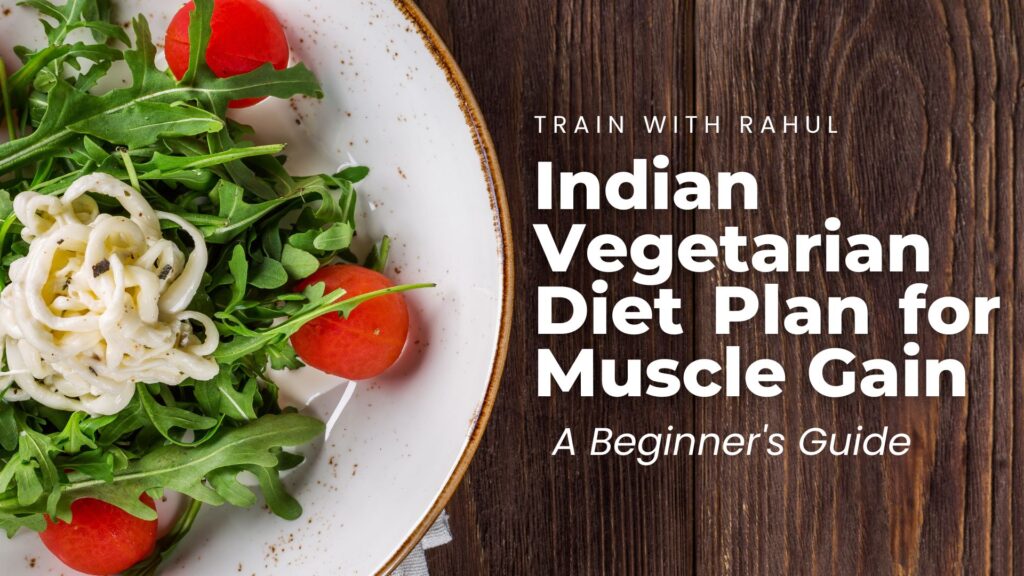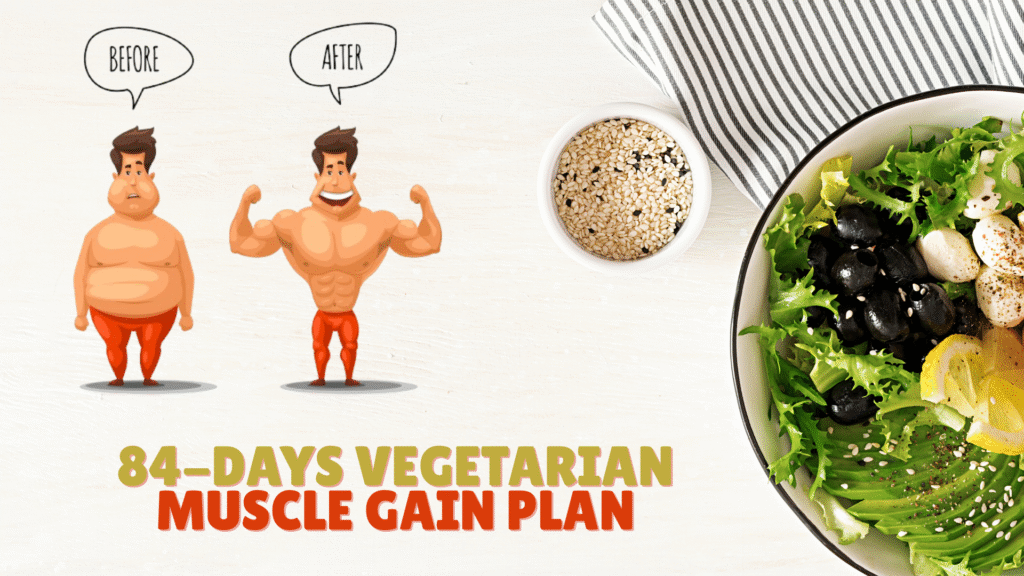Introduction
Building muscle on a vegetarian diet is not only possible but also highly effective when done right. This comprehensive guide offers a science-based Indian vegetarian diet plan for muscle gain. By incorporating high-protein vegetarian foods and structured meal planning, individuals can achieve impressive results without relying on animal products.
A significant portion of the Indian population—approximately 35%—follows a vegetarian diet, with regional variations ranging from 10% to 62%. The vegetarian diet in India is deeply rooted in religious beliefs, cultural traditions, and family customs. These dietary patterns are often passed down through generations and are typically preserved regardless of other lifestyle habits. However, adherence to a vegetarian diet in India is not always accompanied by other health-promoting behaviors, such as regular physical activity.
For those seeking a sustainable and natural way to build muscle, this guide delivers everything from nutritional principles to a full-day sample meal plan rooted in Indian dietary preferences.
Why a Vegetarian Diet Supports Muscle Gain
A successful muscle-building diet revolves around a few key elements:
- Caloric Surplus: You must consume more calories than your body burns daily.
- Adequate Protein Intake: Crucial for muscle repair and growth.
- Progressive Resistance Training: Weight lifting and resistance-based workouts are essential.
- Recovery and Micronutrients: Vitamins and minerals support hormonal balance, muscle repair, and immunity.
According to Harvard Health Publishing, a plant-based diet can support muscle growth effectively when well-planned.
Complete Proteins for Vegetarians
Unlike animal-based proteins, most plant-based proteins are incomplete. However, vegetarians can easily combine complementary protein sources to fulfil their amino acid requirements.
Examples include:
- Rice and lentils (dal-chawal)
- Roti with peanut butter
- Quinoa with beans
- Paneer or tofu with whole wheat chapatis
These combinations ensure the intake of all essential amino acids required for muscle synthesis. For optimal results, aim to include a variety of these combinations throughout the day to maximize amino acid availability. For instance, pairing legumes with grains at multiple meals ensures a steady supply of essential amino acids.
Macronutrient Targets for Muscle Gain
Here are the general macronutrient goals for those on a veg diet for muscle gain:
| Nutrient | Recommendation |
| Calories | 15–20% surplus above maintenance |
| Protein | 1.6–2.2 grams per kg of body weight |
| Carbohydrates | 3–5 grams per kg of body weight |
| Fats | 0.8–1 gram per kg of body weight |
Example: For a 65 kg individual, the daily protein intake should range from 110g to 140g. Carbohydrates are particularly important for fueling intense workouts, while fats support hormone production, including testosterone, which is critical for muscle growth.
You can calculate your personal calorie needs using HealthifyMe’s calorie calculator.
High-Protein Vegetarian Foods in India
When following an Indian bodybuilding diet as a vegetarian, it is essential to focus on high protein vegetarian foods. Below is a list of protein-rich options:
Dairy and Alternatives
- Paneer (100g): 18g protein
- Greek Yogurt (100g): 10g protein
- Milk (Toned) (100ml): 3.5g protein
Legumes and Pulses
- Soya Chunks (Dry) (100g): 52g protein
- Moong Dal: 24g protein
- Chickpeas/Rajma: 22–24g protein
Whole Grains
- Oats (100g): 11g protein
- Quinoa (100g): 14g protein (complete protein source)
- Brown Rice (1 cup): 8g protein
Nuts and Seeds
- Almonds (100g): 21g protein
- Peanuts (100g): 25g protein
- Pumpkin Seeds (100g): 30g protein
For more protein sources, read this list suggested by a certified nutritionist.
Sample Indian Vegetarian Diet Plan for Muscle Gain
Early Morning (7:30 AM)
- Warm water with lemon
- 5 soaked almonds and 2 walnuts
- 1 banana
- Optional: black coffee or green tea
Post-Workout Breakfast (9:00 AM)
- 3 besan chillas with 100g paneer stuffing
- 1 bowl of Greek yogurt
- 1 seasonal fruit
Mid-Morning Snack (11:30 AM)
- 1 scoop of whey or plant-based protein
- 4 soaked dates or 1 banana
Lunch (1:30 PM)
- 1 bowl of brown rice or 2 bajra rotis
- 1 bowl rajma or chole
- Stir-fried mixed vegetables
- 1 bowl of curd
Evening Snack (5:00 PM)
- 1 glass soy milk or almond milk
- 1 whole-grain peanut butter sandwich
- 1 banana
Dinner (8:00 PM)
- 2 ragi rotis or 1 cup cooked quinoa
- Paneer bhurji or tofu stir-fry
- Salad with lemon and seeds
- Small bowl of lentil soup
Bedtime Snack (10:30 PM)
- 1 glass of warm milk with turmeric
- A handful of roasted pumpkin seeds
- Optional: 1 tsp hemp seeds for extra protein
This meal plan is designed for a 65–70 kg individual aiming for muscle gain. Adjust portion sizes based on your body weight and caloric needs. For variety, swap ingredients like quinoa for millets or rajma for black lentils.
Optional Supplements for Vegetarian Muscle Gain
To fill nutritional gaps and enhance performance, consider the following supplements:
-
Whey or Plant-Based Protein: Helps meet daily protein targets.
-
Creatine Monohydrate: Increases strength and endurance.
-
Multivitamins: Covers micronutrient deficiencies.
-
Omega-3 from Algal Oil: Supports heart and brain health.
-
Vitamin B12: Essential for vegetarians, as it’s primarily found in animal products.
-
Branched-Chain Amino Acids (BCAAs): May support muscle recovery during intense training.
Explore vegetarian creatine supplements available in India to support your training regimen.
Tips for Maximizing Muscle Gain on a Vegetarian Diet
- Combine protein sources to get complete amino acid profiles.
- Prep meals in advance to ensure consistency.
- Eat every 3–4 hours to maintain an anabolic state.
- Track macros using apps like MyFitnessPal or Cronometer.
Common Mistakes to Avoid
- Overemphasis on carbohydrates and neglect of protein.
- Skipping meals or not eating enough due to appetite issues.
- Not tracking portion sizes or total calorie intake.
- Relying solely on supplements instead of whole foods.
- Neglecting warm-ups or proper form during workouts increases injury risk.
- Ignoring signs of overtraining, such as persistent fatigue or stalled progress.
Start building muscle today! Discover personalized vegetarian diet plans. Explore Now
Conclusion
Following a structured Indian vegetarian diet for muscle gain is both achievable and effective. By focusing on a caloric surplus, incorporating high-protein vegetarian foods, and training consistently, you can achieve optimal muscle growth. This approach to an Indian bodybuilding diet is not only ethical but also sustainable in the long run.
A properly planned veg diet for muscle gain ensures that your nutritional needs are met while promoting lean muscle mass and recovery. Stay consistent, monitor your progress, and adjust your diet as you grow stronger.


thank you for sharing with us, I conceive this website really stands out : D.
I have been browsing on-line greater than 3 hours these days, but I never found any fascinating article like yours. It’s lovely value enough for me. In my view, if all site owners and bloggers made just right content as you probably did, the internet will probably be a lot more useful than ever before.
Cool blog.
Appreciate it for all your efforts that you have put in this. very interesting info .
There is obviously a lot to know about this. I believe you made various good points in features also.